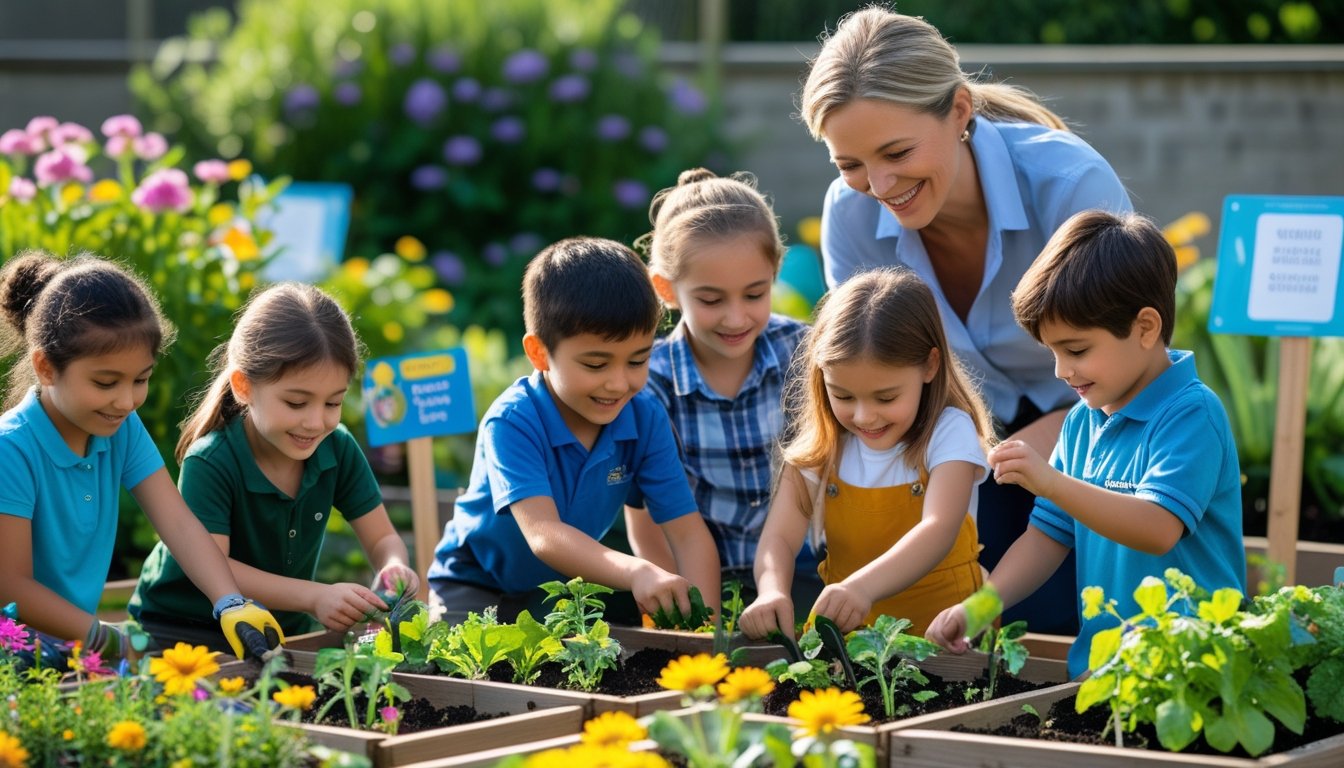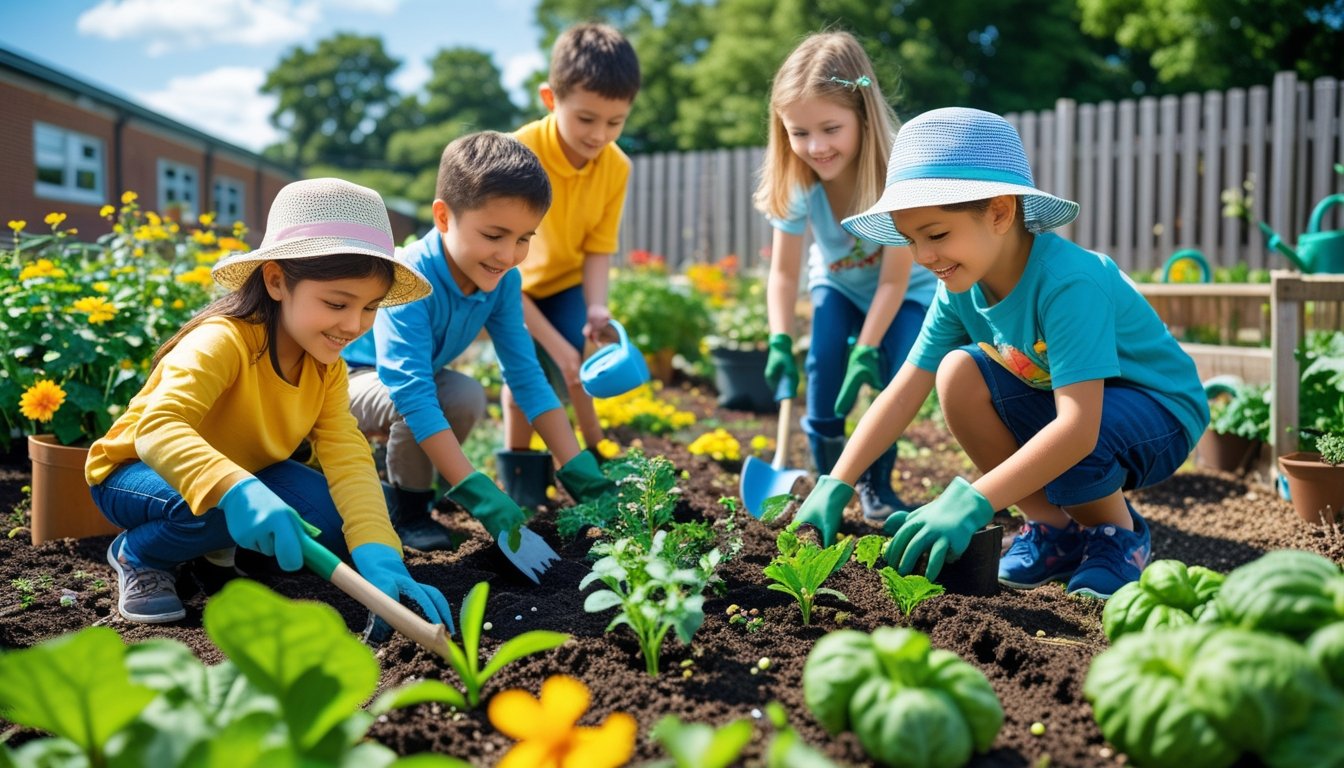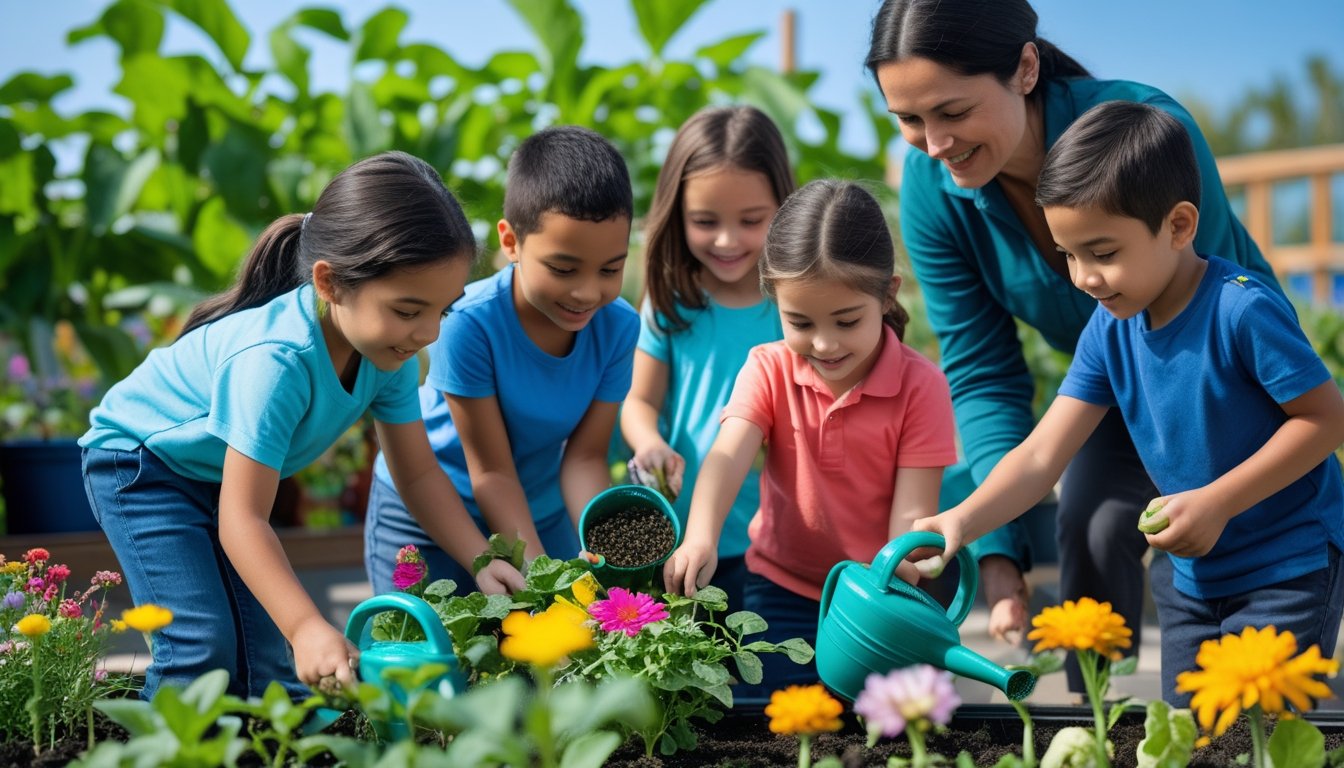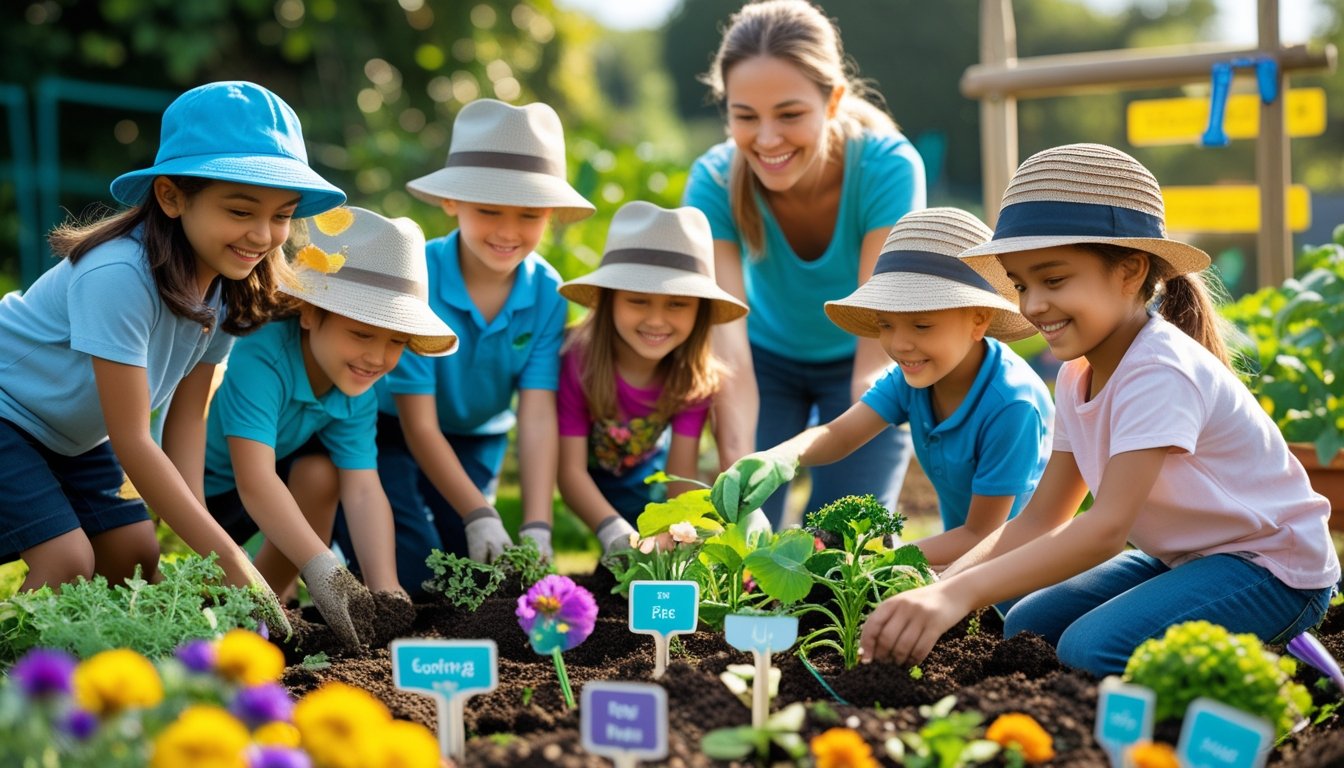Late updated: 15 Oct 2025 09:10
Written by:
The Benefits Of Gardening For Children's Education: Enhancing Learning
Gardening offers a remarkable educational opportunity for children, extending learning beyond traditional classrooms and into the natural world. When children engage with gardening activities, they are not just planting seeds; they are cultivating a sense of responsibility and independence. Gardening enriches children's education by fostering practical skills such as problem-solving and teamwork, while also nurturing a deeper understanding of science and nature.

As we introduce young learners to the wonders of gardening, they gain invaluable hands-on experience that complements their academic curriculum. This experiential learning approach not only enhances cognitive development but also encourages creativity and curiosity. By involving children in activities like designing, planting, and maintaining gardens, they develop a strong connection to the environment and their communities.
The broader impacts are profound. Encouraging gardening habits from a young age helps develop healthy eating practices, patience, and empathy, forming a holistic approach to education and personal growth. By fostering these attributes, gardening prepares children for a lifetime of learning and exploration.
Key Takeaways
- Gardening enhances children's education with practical skills.
- It supports cognitive development and creativity.
- Involvement in gardening promotes healthy living and empathy.
Key Educational Benefits Of Gardening For Children

Gardening offers significant educational benefits for children. It promotes experiential learning, enhances nutrition education, and aids the development of essential social and emotional skills. This hands-on activity allows children to connect actively with their environment, fostering a sense of responsibility and curiosity.
Supporting Hands-On And Experiential Learning
Hands-on learning and experiential activities are central to gardening. Children engage directly with soil, plants, and garden tools, enhancing their understanding of biological processes. Through this interaction, they learn about plant cycles and environmental science.
In the garden, play-based learning takes root as children observe, touch, and nurture plants. They witness the results of their actions, reinforcing concepts in a tangible way. This kind of learning encourages problem-solving skills and critical thinking.
Moreover, school-based gardening integrates various subjects. Mathematics is used for measuring plant growth, while science involves understanding plant biology. Overall, these activities provide rich, multi-disciplinary experiences that traditional classroom settings may lack.
Enhancing Nutrition Education And Healthy Eating Habits
Gardening educates children about nutrition and healthy eating habits. As they grow vegetables and fruits, they gain firsthand insight into where food comes from. This realisation can increase their awareness of nutrition and its impact on health.
Participating in garden-based learning often leads to improved dietary choices. Children are more likely to try and enjoy fruits and vegetables they have tended to. This, in turn, boosts their fruit and vegetable intake and establishes lifelong healthy eating habits.
Nutrition education becomes interactive in the garden. Discussions about food groups, vitamins, and minerals are more engaging when linked directly to what children are growing. This practical approach helps embed important nutrition knowledge in their everyday lives.
Developing Social And Emotional Skills
Gardening activities foster crucial social and emotional learning (SEL) skills. As children work together in a garden, they learn cooperation and teamwork. These interactions help them build social skills that are vital for their development.
Emotional resilience is cultivated through gardening. Children experience the satisfaction of nurturing plant life, alongside challenges like weather or pest issues. Coping with these ups and downs builds patience and perseverance.
Additionally, gardening provides a peaceful environment that supports emotional well-being. Engaging with nature can reduce stress and promote a positive mood. This setting encourages empathy and responsibility, as kids care for living plants collaboratively.
Broader Impacts Of Gardening On Children's Development

Gardening offers profound benefits for the development of children, enhancing skills and promoting environmental consciousness. It fosters community engagement and addresses critical issues like food security. These aspects collectively contribute significantly to children's holistic growth.
Improvement Of Fine And Gross Motor Skills
Gardening actively contributes to the development of fine and gross motor skills. When children engage in tasks like planting seeds, digging, and watering plants, they enhance their coordination and dexterity. Fine motor skills are refined through delicate tasks such as handling seeds or using small tools.
In contrast, gross motor skills are developed through more physical activities like digging and carrying soil, all of which require significant physical activity. This kind of hands-on learning not only aids physical development but also offers a practical application of their energy. It lays a strong foundation for physical competence in various activities beyond gardening.
Promotion Of Environmental Stewardship And Awareness
Gardening is an excellent tool for instilling a sense of environmental stewardship and awareness in children. By participating in activities like maintaining a children’s garden or observing plant growth, they gain direct experience with nature. This kind of interaction fosters an understanding of ecosystems and the importance of biodiversity.
Through garden-based education, children learn about sustainable practices and the impact of human activities on the environment. Concepts like composting and recycling become part of their routine. This awareness encourages responsible behaviours and a commitment to protecting natural resources. Such experiences are invaluable in promoting a lifelong respect for the environment.
Fostering Community Involvement And Food Security
Community gardens and school gardens play a vital role in fostering community involvement and enhancing food security. When children participate in these collaborative environments, they learn the value of teamwork and community engagement. These gardens serve as platforms for social interaction, bringing together people of diverse backgrounds in a common cause.
Additionally, garden-based nutrition interventions can significantly impact vegetable consumption, thereby addressing food insecurity. By nurturing and harvesting their own produce, children develop an appreciation for healthy eating and food production processes. This connection to food sources contributes to a healthier lifestyle and underlines the importance of sustainable food practices.
Frequently Asked Questions

Gardening offers rich educational opportunities for children, enhancing their understanding of science, imparting vital life skills, and promoting health. In this section, we address common questions about how integrating gardening into education can benefit children.
How does gardening enhance a child's understanding of biology and ecosystems?
By nurturing plants, children gain firsthand experience with biological concepts such as plant life cycles and photosynthesis. They observe interactions between plants and insects, fostering an appreciation for ecosystems. This experiential learning helps demystify complex scientific ideas and creates a connection with the natural world.
In what ways can gardening support the development of responsibility and patience in children?
Gardening tasks such as planting, watering, and weeding require regular attention and commitment. These activities teach children the importance of taking responsibility and being patient as they wait for plants to grow. This consistent care cultivates a sense of achievement and discipline.
What role does gardening play in promoting physical activity among school-aged children?
Gardening involves various physical tasks including digging, planting, and lifting. These activities contribute to children's physical development by improving their strength, dexterity, and coordination. Engaging in gardening keeps children active while they enjoy being outdoors.
How does involvement in gardening contribute to a child's awareness of nutrition and healthy eating habits?
Growing fruits and vegetables connects children to the source of their food, encouraging them to appreciate fresh produce. Participating in the process from seed to harvest can stimulate an interest in trying new foods and adopting healthier eating habits. It bridges the gap between garden and plate, making nutrition tangible.
Can gardening activities improve a child's cognitive development and learning outcomes?
Gardening stimulates cognitive growth by encouraging problem-solving and critical thinking. Children learn to plan, observe, and reflect on their gardening activities. These processes enhance learning outcomes across subjects such as science and maths, fostering a practical application of classroom knowledge.
How might gardening be incorporated into a school's curriculum to foster environmental stewardship in children?
Incorporating gardening into the curriculum can involve creating dedicated garden spaces where children engage in hands-on activities. Lessons can integrate sustainability topics, teaching children the importance of protecting natural resources. These experiences underline the value of environmental stewardship, building a foundation for responsible citizenship.
